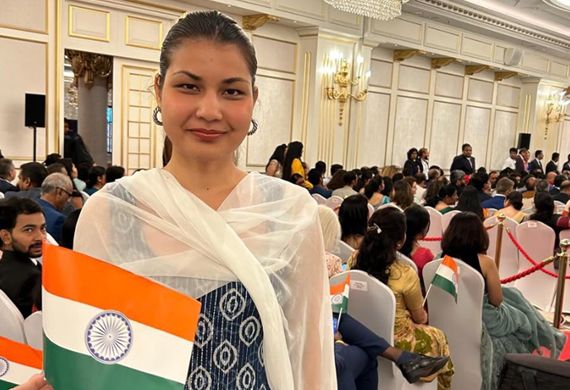
Hemangi Shrivastava Wins Marie Sklodowska-Curie Fellowship in Nuclear Science
By: WE staff | Wednesday, 26 March 2025
- Hemangi Shrivastava is a recipient of the Marie Sklodowska-Curie Fellowship for women in nuclear science.
- Studying electronics and nano electronics at the Moscow Power Engineering Institute (MPEI)
- This is part of Rosatom’s partner university network
Hemangi Shrivastava, an Indian student pursuing her Master in Electronics & Nanoelectronics in Moscow Power Engineering Institute (MPEI), has been awarded the prestigious Marie Sklodowska-Curie Fellowship Programme (MSCFP) for women in nuclear science. MPEI is one of the significant institutions within Rosatom's core and partner university network.
According to Hemangi Shrivastava, illumination engineering and light sources are an "ideal amalgamation of science and art." This profession may not involve nuclear sciences directly, but in her opinion, there are many indirect influences from nuclear energy. "With increasing cheapness and availability of electricity in a nation, there shall be increasing light on the streets," she observed.
Hemangi says, "The primary factor that prompted me to apply to the Marie Sklodowska-Curie Fellowship Program (MSCFP) was attendance at the 2023 World Youth Festival in Sirius, Russia, organized by Rosatom. There, a female professor from Turkey inspired me with her presentation on how nuclear energy is a part of everything, even light. I indeed thank Rosatom, the IAEA, and the MSCFP for this great opportunity!"
Initiated in 2020, the MSCFP-with support from the International Atomic Energy Agency-carefully seeks to encourage more women into the nuclear field. The programme annually selects talented young women students pursuing nuclear-related topics for the master's level, and over 100 women scientists across the globe have become fellows. Since the launch of MSCFP, the programme has received over 2,200 applications, and 560 students were selected for scholarships-from 121 countries.
In this regard, Rosatom has been a prominent partner of the IAEA for MSCFP, sponsoring the study of about 40 female students from 17 countries over a period of four years. For this year, 12 students were sponsored from Rosatom's flagship universities from 10 participating countries- Armenia, Ethiopia, India, Indonesia, Kyrgyzstan, Rwanda, Tanzania, Turkey, Uzbekistan, and Zimbabwe. The scholarship includes tuition fees, internships, and an allowance paid monthly and further financial support from Rosatom.
Vera Upirova, Senior Manager of the Project Office for Education Development and International Cooperation at Rosatom underlined the organization’s values of human-centricity. She gave examples of Rosatom’s interest in human resource development in its partner countries, particularly working with female students at Rosatom partner universities focused on training for careers in the nuclear industry. “This is something we are proud of, our very values corresponding with those of the IAEA, thus increasing the presence of talented women in the nuclear industry contributing to advancement in nuclear technologies, and laying trust on nuclear energy being a green source,” Vera said.
Reflecting on her own experience, Hemangi recalled her talk with a Turkish professor at the festival "I asked her why I was even invited, and she explained how nuclear energy is in everything including light, which completely changed my perspective," shared Hemangi.
Rosatom consistently aligns its strategies with the global sustainable development agenda. In 2020, it adopted a unified policy on sustainable development and became a member of the UN Global Compact, considered to be the largest corporate social responsibility initiative in the world. Rosatom produces about 20 percent of Russia's power and is the largest producer of low-carbon electricity in the country.






